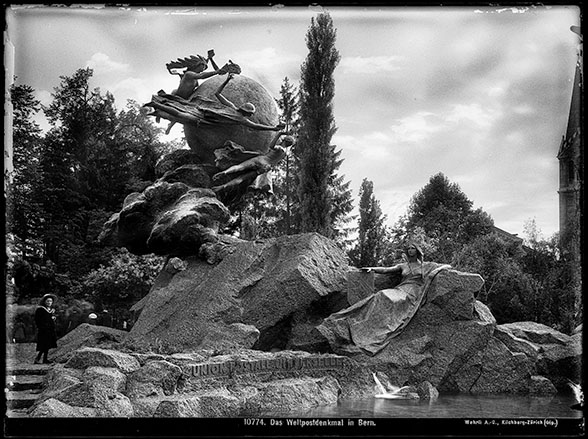At the time when the National Library was being established, the world was experiencing a wave of globalisation. In the years around 1895, many international organisations were being set up to address issues and challenges through joint action. Some of them were based in Switzerland.


© Swiss National Library, Federal Archives of Historic Monuments: Archiv Photoglob-Wehrli
The Communist Manifesto of 1848 concludes with the celebrated rallying cry “Workers of the world, unite”. The message from Karl Marx and Friedrich Engels was a clarion call for transnational solidarity and cooperation among workers: what they saw as a modern internationalism.
For a long time, the concept of internationalism remained closely bound up with Socialism. The workers’ movement, for example, organised itself into the “Socialist International”, which sought to entrench labour law and protections for workers across borders in the closing years of the 19th century. The “International Congress on Labour Legislation” held in 1897 in Zurich laid the foundations for the International Labour Organization (ILO), which commenced operations in Geneva in 1920 as an agency of the League of Nations.
The international Red Cross movement
Socialists were not alone in recognising the necessity of tackling problems from a multilateral perspective. Many economic, infrastructure, political, moral and cultural developments of the time required transnational standards and cooperation between nations. Consequently, more and more international organisations were established: in 1863, Henry Dunant founded the International Committee of the Red Cross (ICRC) in Geneva, with the aim of creating a global, humanitarian set of rules for the treatment of the wounded in conflict situations.
Transport, postal services and sport bring the world together
Technological challenges likewise demanded transnational arrangements. The year 1893 saw the establishment in Bern of the Central Office for International Carriage by Rail (now the Intergovernmental Organisation for International Carriage by Rail, OTIF). Its aim was to coordinate timetables and promote technological standardisation in matters such as track gauges between member states. The Universal Postal Union (UPU) had also set itself up in Bern back in 1874, with the goal of overcoming national boundaries and fostering collaboration between nations in the provision of postal services.
Meanwhile, sport was evolving into a leisure activity, and there was growing interest in establishing international competitions. The first modern Olympic Games, modelled on the event from Antiquity, were held in Athens in 1896. The International Olympic Committee (IOC), which was founded in Paris in 1894, moved its headquarters permanently to Lausanne in neutral Switzerland in 1915, following the outbreak of the First World War.
Switzerland and international organisations – a win-win situation?
Given its special status as a neutral country, it is unsurprising that Switzerland has become home to numerous international organisations.Other reasons for its attractiveness included its central location, highly developed culture of societies and associations, and strong export orientation. Hosting such organisations allowed Switzerland to sharpen its foreign policy profile and establish itself as a partner in diplomatic circles.
The Swiss National Library (NL), which was established at around the same time as many international organisations, saw itself from the outset as a partner of other national libraries, for instance in the creation of internationally compatible bibliographies. The NL thus played its own role in the process of internationalisation around 1900. It also offered to act as the depository for the publications of various international organisations based in Switzerland. That is why today, many documents that have no other connection to Switzerland can be found in the NL’s holdings of “international association publications”.
Further literature and sources:
- Bürgi, Markus: Internationale Arbeitsorganisation (ILO), in: e-HLS, Version vom 20.05.2010
- Burri, Monika; Elsasser, Kilian T.; Gugerli David (Hg.): Die Internationalität der Eisenbahn 1850−1970, Zürich: Chronos 2003 (Interferenzen; 7).
- Friedemann, Peter; Hölscher, Lucian: Internationale, International, Internationalismus, in: Brunner, Otto; Conze, Werner; Koselleck, Reinhart (Hg.) Geschichtliche Grundbegriffe. Historisches Lexikon zur politisch-sozialen Sprache in Deutschland, Band 3: H-Me, Stuttgart: Klett-Cotta 1995: S. 367−397.
- Guex, Marie-Hélène: Olympische Bewegung, in: e-HLS, Version vom 16.01.2017
- Herren, Madeleine: Hintertüren zur Macht. Internationalismus und modernisierungsorientierte Aussenpolitik im Belgien, der Schweiz und den USA 1865-1914, München: Oldenburg 2000 (Studien zur Internationalen Geschichte; 9).
- Herren, Madeleine; Zala, Sascha: Netzwerk Aussenpolitik. Internationale Kongresse und Organisationen als Instrumente der schweizerischen Aussenpolitik 1914−1950, Zürich: Chronos 2002 (Schweizer Beiträge zur internationalen Geschichte; 5).
- Herren Madeleine: Internationale Organisationen seit 1865: Eine Globalgeschichte der internationalen Ordnung, Darmstadt: Wissenschaftliche Buchgesellschaft 2009.
- Herren, Madeleine: Zentralamt für den internationalen Eisenbahnverkehr, in: e-HLS, Version vom 01.02.2013
- Herren, Madeleine: Weltpostverein (UPU), in: e-HLS, Version vom 1.10.2013
- Herren, Madeleine: Internationale Organisationen (IO), in: e-HLS, Version vom 25.08.2020
- Löwy, Michael: Patries ou planète? Nationalismes et internationalismes de Marx à nos jours, Lausanne: Editions Pages deux 1997.
- Marx, Karl; Engels, Friederich: Manifest der Kommunistischen Partei, Zürich: Kommunistische Genossenschaftsbuchhandlung Zürich 1946 [1848].
- Sandoz, Yves: Rotes Kreuz, in: e-HLS, Version vom 27.06.2016
- Documents concerning the seat of international organisations, on the Swiss Diplomatic Documents Platform 1848-1975 (DODIS), 09.09.2020.
Corporate and association publications in the Swiss National Library:
Internationale Kongresse für Arbeiterschutz: V Int. 59
Internationales Arbeitsamt Genf = Bureau internationale du travail = International Labour Organization: V Int 62
Internationales Rotes Kreuz (IKRK) = Comité Internationale de la Croix Rouge (CICR): V Int 915
Zentralamt für den internationalen Eisenbahnverkehr: V Int 316
Union postale universelle, UPU: Int 828
Comité internationales olympique, CIO: V Int 750
Last modification 15.10.2020
Contact
Swiss National Library
SwissInfoDesk
Information Retrieval Service
Hallwylstrasse 15
3003
Bern
Switzerland
Phone
+41 58 462 89 35
Fax
+41 58 462 84 08





